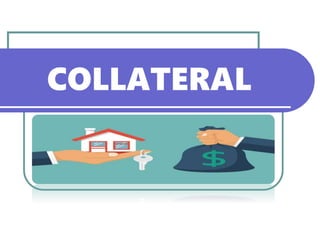
Collateral
- 1. COLLATERAL
- 2. Definition Collateral – is money or property that is pledged as security for repayment of a loan. This is often required by lending institutions as a safeguard in case the loan is not or cannot be repaid. As a result, the collateral used can now be sold by the lending agency.
- 3. PURPOSE If a loan is not repaid on time the assets used as collateral can be seized or sold to recover the balance of the loan. Collateral makes an investment more attractive and interesting to investors. Adding collateral minimizes the risk of an investment’s default, i.e., the foregoing of that item to repay debt since most companies or individuals do not want to lose their pledged collateral as a result of non payment.
- 4. Collateral is important because it is often used to access the capital or money needed to start a business. This is so as entrepreneurs do not have the necessary money to finance start up operations of their business. VALUE of Collateral
- 5. TYPES of Collateral There are infinite types of collateral in existence as virtually anything can be used for such purposes as long as it is acceptable to the lender. The nature of the collateral acceptable for any loan would depend upon the type of loan, structure of repayment terms and conditions, amount borrowed.
- 6. Types cont’d…. The following are some of the common types of collateral usually demanded and accepted by commercial loan lenders.
- 7. Types cont’d 1.Real Estate – land and building represent one of the most common types of collateral in use especially for long term loans. These can be houses, office buildings, shopping centers, warehouses or factory buildings. Using the home of the entrepreneur as a form of collateral is very risky since the bank will have the legal deed to the house and if the business fails, it has the right to sell and recover the loan payment.
- 8. Not only is the entrepreneur’s livelihood affected but also the security of his family is at stake. The business premises can only be used if the business owns the building and it is not being paid for by an existing loan or mortgage.
- 9. Types cont’d 2. Plant and Equipment – This refers to manufacturing plant & machinery, trucks, drilling rigs, presses, forklifts and similar items. These are usually applicable to long term loans. In order for the lender to ascertain the appropriate amount to be sanctioned for the loan, a professional valuation is obtained of the plant and machinery to be used as collateral.
- 10. Equipment trust certificates are then issued as bonds secured by as specific type equipment. 3. GUARANTOR - this is another person with adequate personal wealth who agrees to pay the back the loan back if the business should fail and it defaults on the loan repayments. The bank will ask for details of the guarantor’s assets before agreeing to this form of collateral.
- 11. Types cont’d 4. Life Insurance Policies - this pays out a pre- determined amount of money on the death of the policy holder. Banks often insist on these as collateral because in the event of the entrepreneurs death, it would be unlikely that the business itself could repay outstanding loans.
- 12. Types cont’d 5. Life Assurance Policies - these are forms of savings the entrepreneur many have arranged with an insurance company. They pay out a certain sum either on death or after a stated number of years. If they had a definite ‘surrender” value then banks would be prepared to accept these as security on the loan.
- 13. Types cont’d 6. Personal Guarantee – this applies to limited companies only as with other business types the owner’s assets are already at risk from business failure. Here, the directors of the company promise to pay up from their personal funds should the business be unable to make loan repayments.
- 14. Types cont’d Other items can be used as collateral, including: Investment documents (such as share certificates and debenture certificates) Antique furniture Gold, silver and other valuable jewellery Rare and valuable works of art Appliances